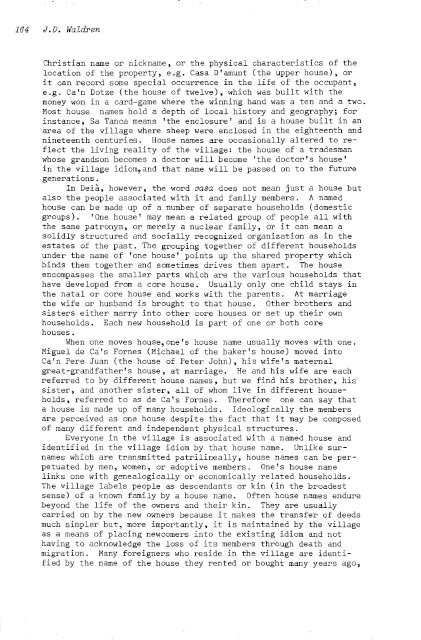CONTENTS NO.I - Institute of Social and Cultural Anthropology ...
CONTENTS NO.I - Institute of Social and Cultural Anthropology ...
CONTENTS NO.I - Institute of Social and Cultural Anthropology ...
You also want an ePaper? Increase the reach of your titles
YUMPU automatically turns print PDFs into web optimized ePapers that Google loves.
164 J.D. WaZdren<br />
Christian name or nickname, or the physical characteristics <strong>of</strong> the<br />
location <strong>of</strong> the property, e.g. Casa D'amunt (the upper house), or<br />
it can record some special occurrence in the life <strong>of</strong> the occupant,<br />
e.g. CaIn Dotze (the house <strong>of</strong> twelve), which was built with the<br />
money won in a card-game where the winning h<strong>and</strong> was a ten <strong>and</strong> a two.<br />
Most house names hold a depth <strong>of</strong> local history <strong>and</strong> geography; for<br />
instance, Sa Tanca means 'the enclosure' <strong>and</strong> is a house built in an<br />
area <strong>of</strong> the village where sheep were enclosed in the eighteenth <strong>and</strong><br />
nineteenth centuries. House names are occasionally altered to reflect<br />
the living reality <strong>of</strong> the village: the house <strong>of</strong> a tradesman<br />
whose gr<strong>and</strong>son becomes a doctor will become 'the doctor's house'<br />
in the village idiom,<strong>and</strong> that name will be passed on to the future<br />
generations.<br />
In Deia, however, the word easa does not mean just a house but<br />
also the people associated with it <strong>and</strong> family members. A named<br />
house can be made up <strong>of</strong> a number <strong>of</strong> separate households (domestic<br />
groups). 'One house' may mean a related group <strong>of</strong> people all with<br />
the same patronym, or merely a nuclear family, or it can mean a<br />
solidly structured <strong>and</strong> socially recognized organization as in the<br />
estates <strong>of</strong> the past. The grouping ~ogether <strong>of</strong> different households<br />
under the name <strong>of</strong> 'one house' points up the shared property which<br />
binds them together <strong>and</strong> sometimes drives them apart. The house<br />
encompasses the smaller parts which are the various households that<br />
have developed from a core house. Usually only one child stays in<br />
the natal or core house <strong>and</strong> works with the parents. At marriage<br />
the wife or husb<strong>and</strong> is brought to that house. Other brothers <strong>and</strong><br />
sisters either marry into other core houses or set up their own<br />
households. Each new household is part <strong>of</strong> one or both core,<br />
houses.<br />
When one moves house,one's house name usually moves with one.<br />
Miguel de Ca's Fornes (Michael <strong>of</strong> the baker's house) moved into<br />
Ca'n Pere Juan (the house <strong>of</strong> Peter John), his wife's maternal<br />
great-gr<strong>and</strong>father's house, at marriage. He <strong>and</strong> his wife are each<br />
referred to by different house names, but we find his brother, his<br />
sister, <strong>and</strong> another sister, all <strong>of</strong> whom live in different households,<br />
referred to as de Ca's Fornes. Therefore one can say that<br />
a house is made up <strong>of</strong> many households. Ideologically the members<br />
are perceived as one house despite the fact that it may be composed<br />
<strong>of</strong> many different <strong>and</strong> independent physical structures.<br />
Everyone in the village is associated with a named house <strong>and</strong><br />
identified in the village idiom by that house name. Unlike surnames<br />
which are transmitted patrilineally, house names can be perpetuated<br />
by men, women, or adoptive members. One's house name<br />
links one with genealogically or economically related households.<br />
The labels people as descendants or kin (in the broadest<br />
a known family by a house name. Often house names endure<br />
beyond the life <strong>of</strong> the owners <strong>and</strong> their kin. They are usually<br />
carried on by the new owners because it makes the transfer <strong>of</strong> deeds<br />
much simpler but, more importantly, it is maintained by the<br />
as a means <strong>of</strong> placing newcomers into the existing idiom <strong>and</strong> not<br />
having to acknowledge the loss <strong>of</strong> its members through death <strong>and</strong><br />
migration. Many who reside in the village are identified<br />
by the name <strong>of</strong> the house they rented or bought many years ago,

















